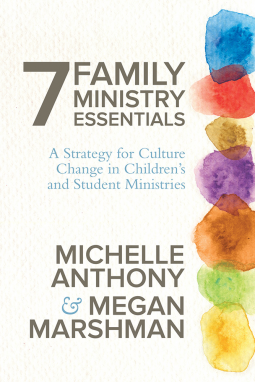
7 Family Ministry Essentials
A Strategy for Culture Change in Children's and Student Ministries
by Michelle Anthony, Megan Marshman
This title was previously available on NetGalley and is now archived.
Send NetGalley books directly to your Kindle or Kindle app
1
To read on a Kindle or Kindle app, please add kindle@netgalley.com as an approved email address to receive files in your Amazon account. Click here for step-by-step instructions.
2
Also find your Kindle email address within your Amazon account, and enter it here.
Pub Date Jun 01 2015 | Archive Date Jul 01 2015
David C Cook | David C. Cook
Description
1. Empowering families to take spiritual leadership in the home
2. Forming lifetime faith that transcends childhood beliefs
3. Teaching Scripture as the ultimate authority of truth
4. Understanding the role of the Holy Spirit to teach and transform
5. Engaging every generation in the gospel of God's redemptive story
6. Making God central in every biblical narrative and daily living
7. Participating in community with like-minded ministry leaders
7 Family Ministry Essentials will energize and equip you with the practical steps, inspirational stories, and biblical foundation you need as you lead those in your ministry.
Available Editions
| EDITION | Paperback |
| ISBN | 9780781412971 |
| PRICE | $15.99 (USD) |
Average rating from 5 members
Featured Reviews
 Conrade Y, Reviewer
Conrade Y, Reviewer
It is no longer news. The young are leaving churches. Church going Families are struggling. The elderly are aging. How is the people of the Church discipling the young? Churches all over the world find ministry to youths and children particularly challenging. This is made more difficult as each successive generation comes with very unique set of needs and attention. Whatever it is, youths are extremely sharp in terms of identifying the problems in many existing church structures and programs. Want to know what's wrong with any church? Just ask the young people. They have the capacity to tell it as it is. Churches need a movement rather than programs. People need to know the cost of of discipleship. We need to recognize that the key to ministry among children and students is the combined effort of church and families. Individually we will always lack but collectively we survive better. Family ministry is very much a part of the mission of the church. Authors Michelle Anthony and Megan Marshman propose seven essentials for us to incorporate into any family ministries, in order to initiate a culture change.
Empowering Family as Primary Spiritual Formation for Lifetime Faith Scripture Is Our Authority The Holy Spirit Teaches God’s Grand Redemptive Narrative God Is Central A Community of Ministry Support
The first essential is about empowering the family as primary spiritual care environment. Parents must be the "primary nurturers." The Church needs to equip these parents and together, to become a "family of families." Instead of asking children what they learn in church on any one day, why not ask them what they learn at home? The idea of a "parent shepherd" is an interesting one where such persons support small groups through prayer, hospitality, and "parent outreach." The approach is four-fold: "Instruct, Model, Practice, and Empower." They give some practical applications for doing that, like the ten environments for demonstrating God at work.
The second essential is a life-long spiritual formation for any one generation. Spiritual formation is not some boring exercise. It is about letting Christ be formed in us. In order for this goal to be met, we need to be aware of the three temptations that are overly information-centered; too moralistic; and lacks hope. Using Hebrews as a guide, readers learn of Christ being greater than any man-made ideas, concepts, devices, and systems. The authors compare "Christian Education" and "Spiritual Formation" and distinguish them with examples and descriptions. True spiritual formation is to let the Holy Spirit lead and guide us, as we remain intentional and open about our willingness to be formed by God according to God's perfect timing.
The third essential is about letting Scripture be our Absolute Authority and Truth. Authority is an increasingly referred to pejoratively in many Western societies. The important thing about submitting to biblical authority is not about answering to a set of rules, but to align our lives according to the eternal relationship with God. The Word reveals God to us and we obey God on the basis of trust.
The fourth essential is that of the Holy Spirit as our Teacher. We are empowered by God through the Holy Spirit to do God's work. We are tempted to do things in our own strength, sometimes in the name of God. Like the wind and the sails, we can choose to paddle our way forward or to let our sails catch the wind. Learning to trust and discern the Holy Spirit's movement is vital.
The fifth essential is the big story of God, through the "Grand Redemptive Narrative." The gospel is not all about us. It is all about Christ and how we can do our part as a member of the body of Christ. The main character is always God. The beauty of it is that God's focus was to redeem us out of darkness into His wonderful light. He likes us to participate in His grand narrative. When we realize we are part of the big story, life will no longer be boring or stuck in some rut. We will be open to God leading us to live beyond ourselves.
The sixth essential is to fix our eyes on God, the Author and Finisher of our faith. God is central. We fix our focus upward. We are filled inward. Blessings will overflow through us and we live with God as the center of our ministry. Sometimes, we make the mistake of putting our ministry first and our expectations before God. Through Romans, the authors remind readers that when we learn to put God first, we need to learn the sacrificial way of Christ.
The final essential is about community. No man is an island. It is learning to live together, warts and all. It is working together to inspire the team, to equip people for the ministry, and to support one another for the long run.
Each essential is followed up with a ministry assessment that calls for self-reflection. It makes us ponder about the motivation behind our service. It helps us to re-orientate ourselves and adjusts our sails. I think there is a double meaning in the word "family ministry." On the one hand, it is referring to the biological family we have. On the other hand, we remember that each of us is a part of the larger family of God. All of the seven essentials are applicable for both. At first, it is tempting to treat these seven essentials as another set of do's and don'ts for us to follow. The authors toward the end remind us that they are not. Instead, they are "environments to create a culture." Thus, feeding must be accompanied by exercise, theory with practice, and helping one another to press on in faith.
In reading this book, it is important not to be too caught up with various steps or sequence of the steps, even though they appear to be laid out in sequence. Some may be more relevant and others may not register any bell at all. Begin with what is most relevant and work the rest through. For those of us who like to start with a solid foundation, begin with the third essential. For those who wants a big picture as a start, start with the fifth. Some may start with the Sovereignty of God, while others may have family concerns as primary. That is ok. Whatever it is, begin where we felt most appropriate and gradually link up with the rest. In that manner, we can adapt the ideas accordingly. Written clearly and with well executed examples, ministry leaders will find this book an essential resource in their libraries.
Rating: 4.25 stars of 5.
conrade This book is provided to me courtesy of David C. Cook Publishers and NetGalley in exchange for an honest review. All opinions offered above are mine unless otherwise stated or implied.














